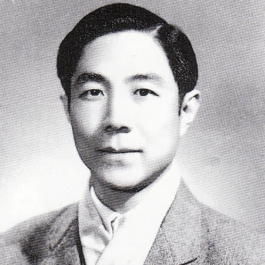Yang Dajun

Yang Dajun, a famous Chinese music educator, pipa artist, composer, famous Chinese painter, professor of China Conservatory of Music. Mr. Yang Dajun was born in Baoding City, Hebei Province on April 11, 1913. He was devoted to art since childhood and was diligent and eager to learn. He studied literature, Chinese painting, and pipa in his early years. He studied at Baoding Normal University, Hebei University Department of Literature, and Beijing Jinghua. Department of Chinese Painting of the Academy of Fine Arts.
He studied under the Pinghu School master Li Fangyuan's disciple Zhu Ying for many years, and was taught by Wang Yuting, Xu Lisun and other famous pipa masters. He is well-known in the world as a generation master of Chinese pipa art with his superb attainments. In order to study folk music, Mr. Yang Dajun spent almost all his spare time.
He has studied the music of Qing court ceremonies, sorted out "Beijing Shifan Gong and Drum", collected the musical instrument pictures of "Da Qing Hui Dian", and made a special trip to Emei Mountain and Qingcheng Mountain to collect Buddhist and Taoist music in Sichuan, and used this as material to create music. The ensemble "Fanshan Bells and Drums". He roamed in the vast ocean of folk music and felt endless joy. Shortly after the July 7 Incident, he joined the Democratic Alliance organized by Shen Junru and Guo Moruo, composed the pipa song "Blood on the Lugou Bridge" and performed it on the front lines of the Anti-Japanese War. He once again participated in the formation of the China Democratic League in the Xianying Residence of "Special Garden" in Chongqing. A series of creative music continued to inspire compatriots across the country to persevere in the war of resistance to the end, regain lost ground, rebuild their homes and revitalize China.
After the birth of New China, he created "Victory Gongs and Drums" to express his inner joy and love for the motherland and the people. Yang Dajun is highly respected, upright and open-minded. He is strict with discipline, forgiveness, and treats people with enthusiasm, humility, and amiability. He is approachable and has the demeanor of a loyal elder. He lived a frugal life, did not seek enjoyment, was detached from other things, was calm and comfortable, and was not burdened by worldly wealth. In December 1987, Mr. Yang Dajun left us.
Similar artist
Involving musical instruments
Involved portfolio
Involved news
Popular artists
- 01 Zhang Xiuyan
- 02 Chen Tao
- 03 Li Muliang
- 04 Zhu Changyao
- 05 Zhang Gaoxiang
 渝公网安备 50010702504639号
渝公网安备 50010702504639号